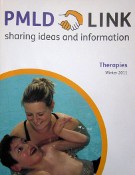What do the terms 'therapy' and 'therapist' really mean in early childhood intervention for children who need on-going multiple interventions?
 "I began to wonder what would be left in the therapy basket if we took out those things that seem to overlap with education or with medicine" - An article by Peter Limbrick with Lynne Boulter, Liz Wassall and Suzanne Rimmer.
"I began to wonder what would be left in the therapy basket if we took out those things that seem to overlap with education or with medicine" - An article by Peter Limbrick with Lynne Boulter, Liz Wassall and Suzanne Rimmer.
Below are the introductory paragraphs to an article in PMLD-Link, Vol 23, No. 3, Issue 70 of Winter 2011:
There are moves in service provision in early childhood intervention (ECI) for children with disabilities and special needs in the UK and some other countries that will erode the primacy of statutory public services and increasingly embrace the voluntary and private sectors and, at the same time, empower some parents as budget holders. We are already seeing at such UK exhibitions as Naidex and Kidz up North (etc.) that therapy has an important place in this rapidly expanding market so it seems a good time to put 'therapy' under the microscope to see what the word means.
In my teaching career I have worked alongside physiotherapists (PTs), speech and language therapists (SALTs) and occupational therapists (OTs) since the 1980s with children and young people for whom, to be effective, I needed to be in collaborative teacher-therapist partnerships – ideally including parents. These working relationships gave me a sense of security in my work, a growing whole-child competence and a richer knowledge and skill base.
Until I became a keyworker/interventionist with neurologically impaired infants and their families in the charity One Hundred Hours (Limbrick-Spencer, 2001) I had assumed ECI could be neatly divided into treatment, therapy and education offered by medics, therapists and teachers respectively. Working closely with therapists in One Hundred Hours I began to see that much therapy work shared the same approaches and goals as education (e.g. in alternative communication) or nursing – chest drainage, for example. I am also aware that some paediatric therapists are now taking on particular functions that have traditionally belonged to paediatricians.
I began to wonder what would be left in the therapy basket if we took out those things that seem to overlap with education or with medicine. This exercise should help to define the term therapy and point to the exclusive domain of therapists, and offer increased clarity to new parents trying to make informed choices about what they want for their child and family – choices made much harder now because of the bewildering array of therapies that might be sold to eager parents at a very vulnerable time.
The full article is in PMLD-Link, available by subscription from This email address is being protected from spambots. You need JavaScript enabled to view it.(UK)
or at http://www.pmldlink.org.uk/the-journal/content-of-the-current-issue.shtml

